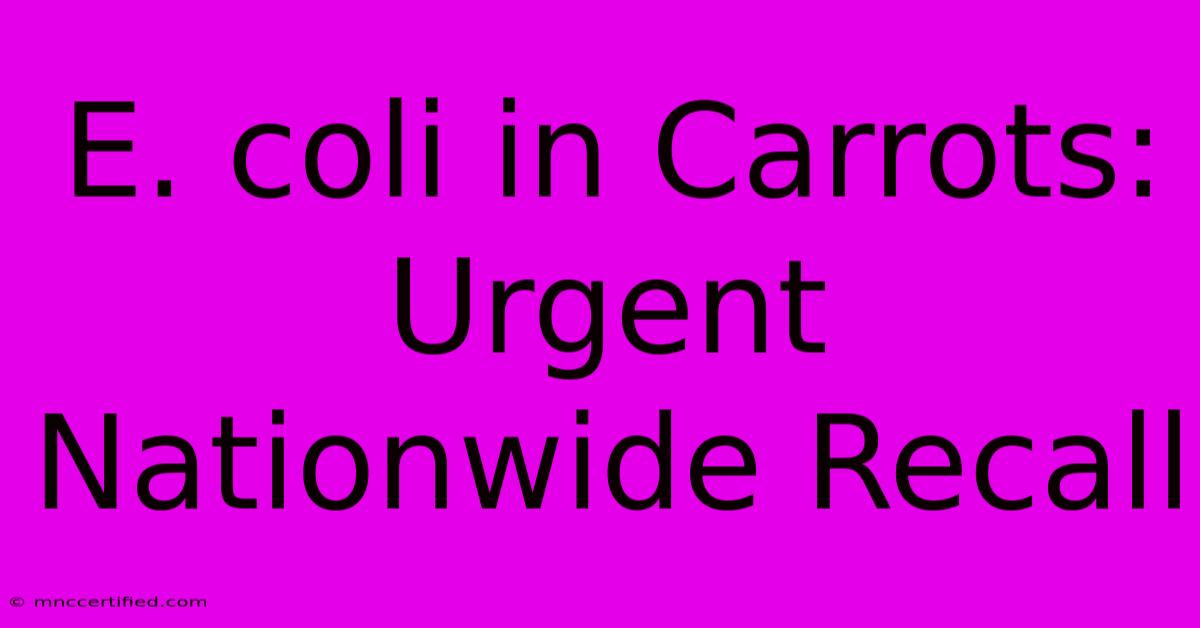E. Coli In Carrots: Urgent Nationwide Recall

Table of Contents
E. coli in Carrots: Urgent Nationwide Recall - What You Need to Know
A potentially dangerous situation has emerged, prompting an urgent nationwide recall of carrots due to E. coli contamination. This article provides crucial information about the recall, the risks associated with E. coli infection, and steps you can take to protect yourself and your family.
Understanding the E. coli Contamination
Escherichia coli (E. coli) is a type of bacteria commonly found in the intestines of humans and animals. While most strains are harmless, some, like the Shiga toxin-producing E. coli (STEC), can cause severe illness. The current recall is due to the detection of STEC in a batch of carrots distributed nationwide. This strain can lead to serious complications, including hemolytic uremic syndrome (HUS), a type of kidney failure.
Symptoms of E. coli infection can include:
- Severe stomach cramps
- Diarrhea (often bloody)
- Vomiting
- Fever
These symptoms typically appear within two to eight days after consuming contaminated food. If you experience these symptoms after consuming carrots, seek immediate medical attention.
Identifying Recalled Carrots
The specific brand(s) and lot numbers of the recalled carrots will vary depending on the source of the contamination and the issuing authorities. Check the official announcements from the Food and Drug Administration (FDA) and the relevant agricultural departments in your area. These announcements will clearly identify:
- Brand Name: The specific brand of carrots affected.
- Product Description: Details about the type of carrots (e.g., baby carrots, whole carrots).
- Packaging Information: Any unique identifiers on the packaging, such as lot numbers, UPC codes, or best-by dates.
- Distribution Area: The geographical regions where the recalled carrots were distributed.
It's crucial to check the packaging of any carrots you have at home and compare them against the official recall information. Do not consume any carrots that match the recall details.
What to Do if You Have Recalled Carrots
If you possess carrots that match the description of the recalled product:
- Do not eat them.
- Dispose of them immediately. Place them in a sealed bag and dispose of them according to your local waste disposal regulations.
- Wash your hands thoroughly after handling the recalled carrots.
- Thoroughly clean and disinfect any surfaces that came into contact with the recalled carrots.
Preventing E. coli Infection
While this recall highlights a specific incident, practicing safe food handling habits is crucial to minimize your risk of E. coli infection year-round. Remember to:
- Wash your hands: Before, during, and after food preparation.
- Wash produce thoroughly: Rinse all fruits and vegetables under running water before consuming or preparing them.
- Cook food to safe temperatures: Ensure that meat, poultry, and eggs are cooked to the proper internal temperature to kill harmful bacteria.
- Avoid cross-contamination: Keep raw meat, poultry, and seafood separate from other foods.
Staying Informed and Updated
The situation is dynamic. Regularly check the websites of the FDA and your local health authorities for updates on the recall. Subscribe to their alerts or follow them on social media for real-time notifications. Your health and safety are paramount. Don't hesitate to contact your healthcare provider if you have concerns.
This information is for general knowledge and informational purposes only, and does not constitute medical advice. Always consult with a qualified healthcare professional for any health concerns or before making any decisions related to your health or treatment.

Thank you for visiting our website wich cover about E. Coli In Carrots: Urgent Nationwide Recall. We hope the information provided has been useful to you. Feel free to contact us if you have any questions or need further assistance. See you next time and dont miss to bookmark.
Featured Posts
-
Life Insurance Social Media Posts
Nov 19, 2024
-
Portugal Hotel Investment Appeal
Nov 19, 2024
-
Cyber Insurance Incident Response
Nov 19, 2024
-
Bernards Take Kelces Worst Game
Nov 19, 2024
-
Team News Croatia Vs Portugal Lineups
Nov 19, 2024